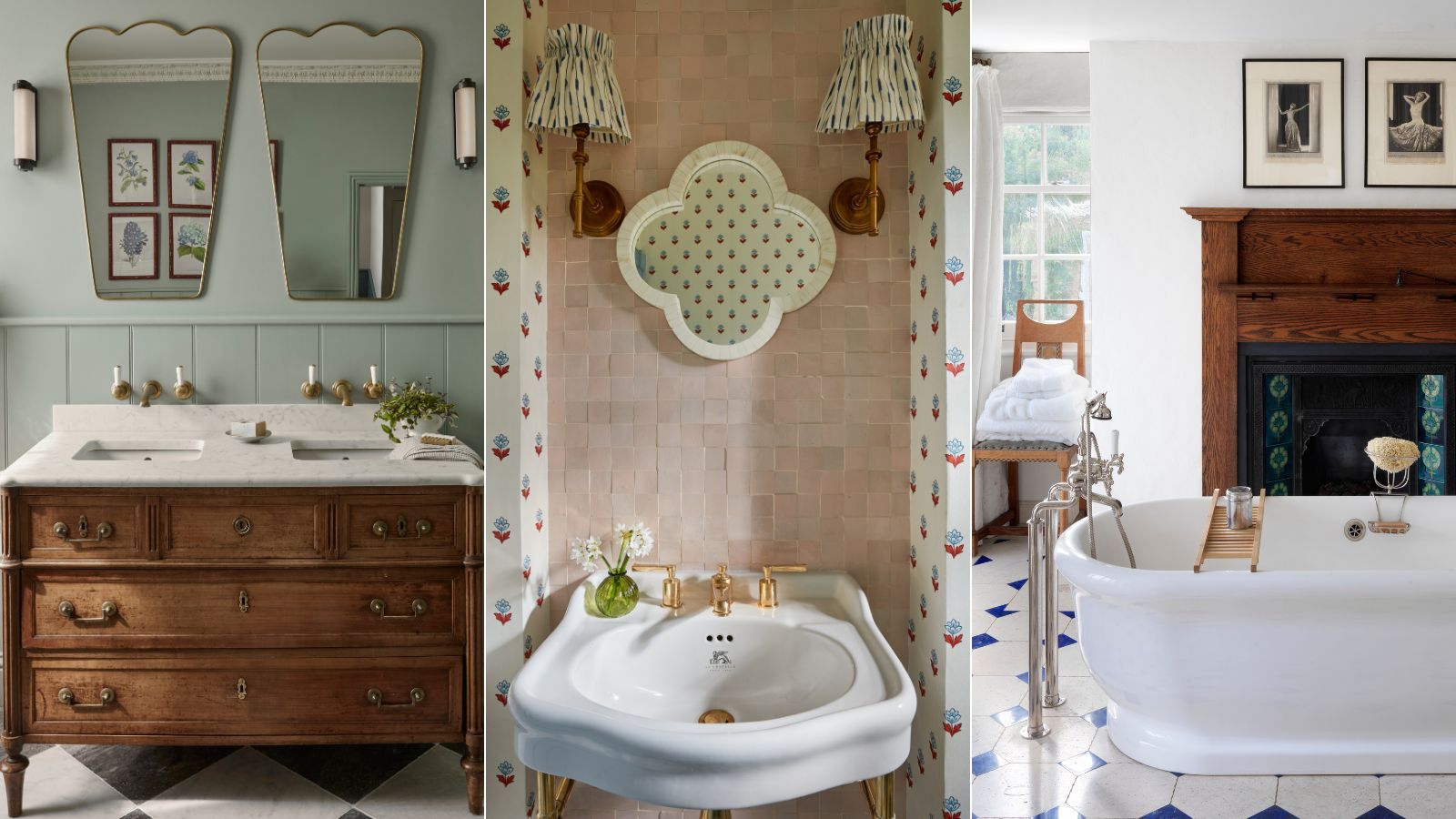
As a space in which you start and end your day, it seems only right that we place a little importance on getting the vibes right. And that's where this blend of old-world charm and contemporary style comes to the rescue.
Transitional design is the answer to finally waving goodbye to austere, functional bathrooms of old that are devoid of any warmth and personality. If you're embarking on a bathroom remodel and feeling torn between a traditional bathroom filled with character and one with more contemporary form and function; with this bathroom trend, you can have the best of both worlds.
The result is stylish, timeless, and brimming with character. To find out how to perfectly blend this amalgamation of design styles for maximum comfort and minimal clash, we've consulted the experts for transitional bathroom ideas below.
What Is Transitional Design?
Transitional design represents a nuanced approach blending more traditional style with modern pieces and function, in order to create a home that never dates. It strikes that perfect balance between the warmth and familiarity of classic, traditional elements and the clean lines and functionality inherent in modern design.
Key characteristics include a mix of eras, textures, and a thoughtful combination of furnishings and colors that bridge the gap between old-world elegance and contemporary simplicity. The essence of transitional design lies in creating environments that appeal to those who want to decorate with the very best of both design worlds.
How To Blend Old And New In The Bathroom
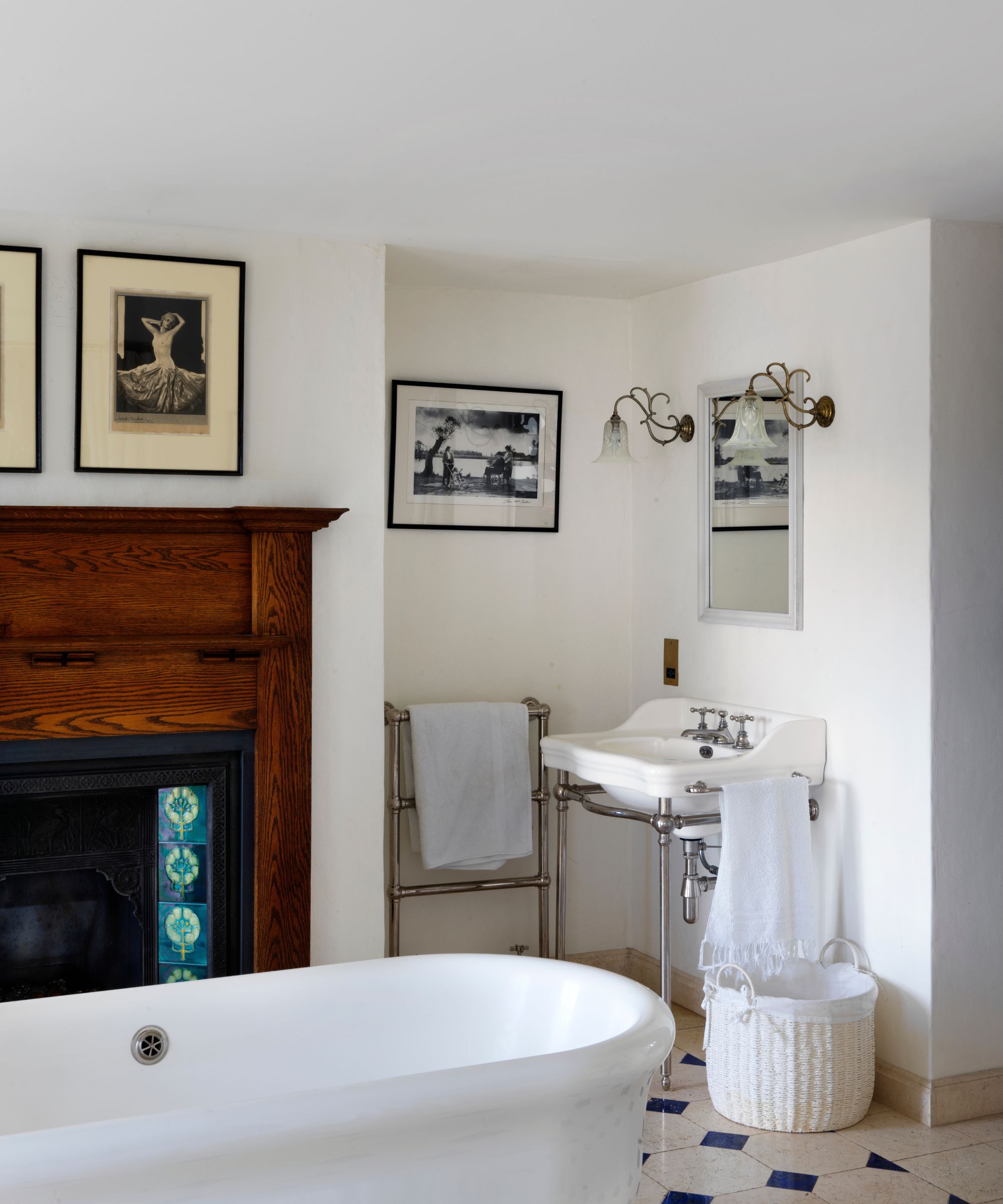
The key ingredient to perfecting this bathroom style is finding the harmony between classic aesthetics and modern form and function. The best part? There are no hard and fast rules, as long as you provide a mix and match of the two sensibilities in a way that prioritizes design – whether you focus on fixtures, materials, or accents to create a warm and welcoming feel.
Barrie Cutchie, design director at luxury bathroom design firm BC Designs, says: 'This style is about clean lines, yet not overly contemporary, with a warm, comfortable feeling that is not too cold or sleek,' he explains. 'It gives homeowners the best of both worlds, as well as providing an opportunity for an individual’s personality to shine through. It doesn’t matter which items are from the modern or traditional periods, only that there should be a mixture of the two.'
You could invest in a claw-foot freestanding bathtub with polished marble tiling, or prioritize modern sanitaryware with a mix of decorating with antiques like a vintage rug, wall sconces, or statement fabrics for a sink skirt and window dressing. How you combine the elements is up to you – with a little guidance from the experts. Here's what interior designers think.
1. Focus on the 'new' to create your foundations
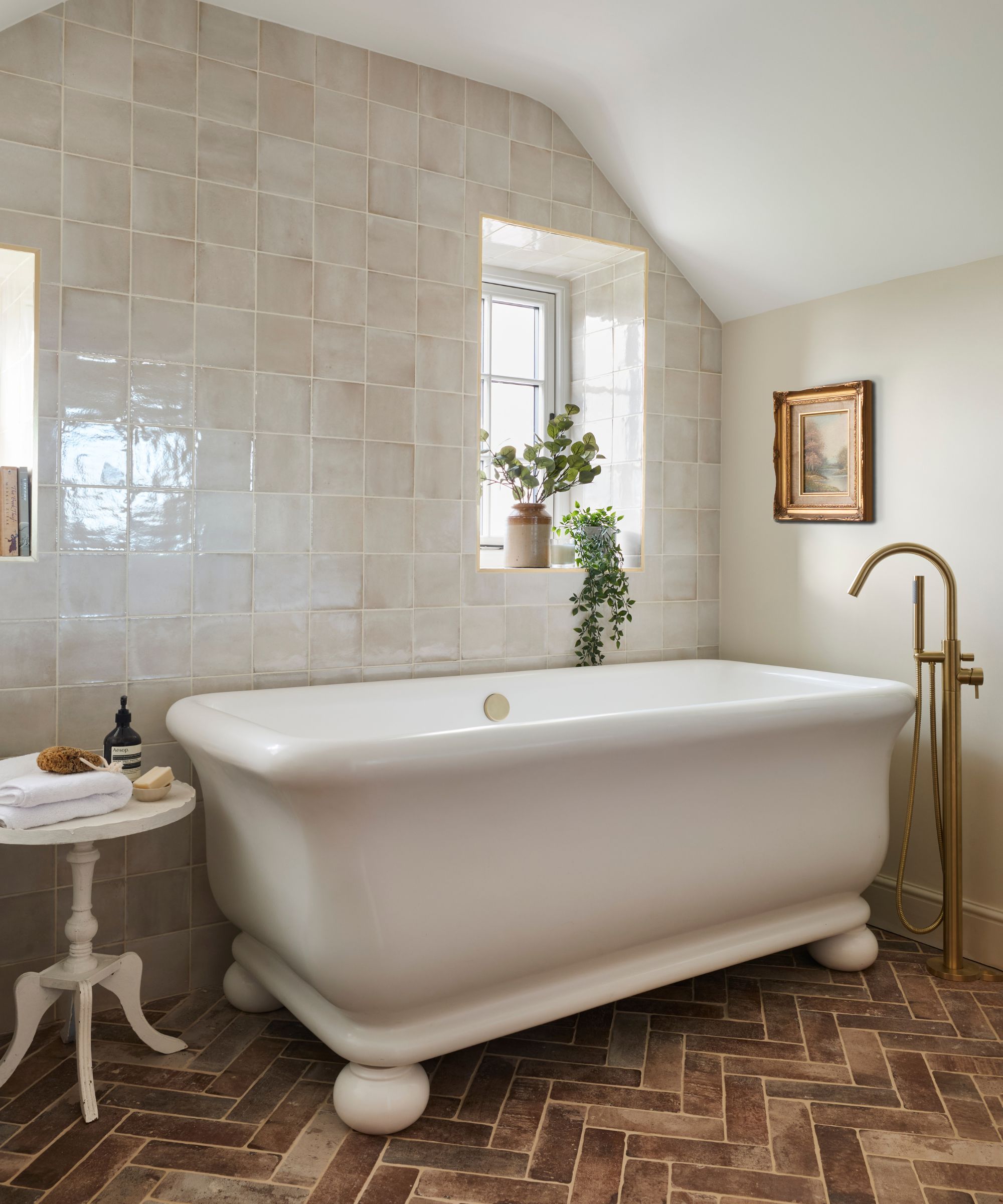
It sounds relatively obvious, but we've all got to start somewhere. And in order to truly nail transitional style, focusing on acquiring your contemporary fixtures and fittings first will lay the groundwork for integrating antique or heirloom pieces while maintaining a space that resonates with modern functionality, too.
'When it comes to bringing a transitional look in your bathroom – that is, an aesthetic that blends elements of older traditions with modern design elements –there are some areas where you're definitely going to want to start with the new,' advises interior designer Kathy Kuo.
'Take care of essentials like your bathtub, pedestal, toilet paper holder, and towel rack first. Then, bring in decorative pieces that feel more antiqued or heirloom to complete the look,' says Kathy. 'Think mirrors with traditional frames, antiqued soap dishes, classic-looking wall art, and light fixtures with an eye-catching patina on the hardware.'
Today's bathrooms demand a lot. Smart toilets, touchless faucets, and space-saving storage will not only elevate convenience but bring a fresh, modern appeal to the transitional design.
2. Embrace existing traditional features and quirks
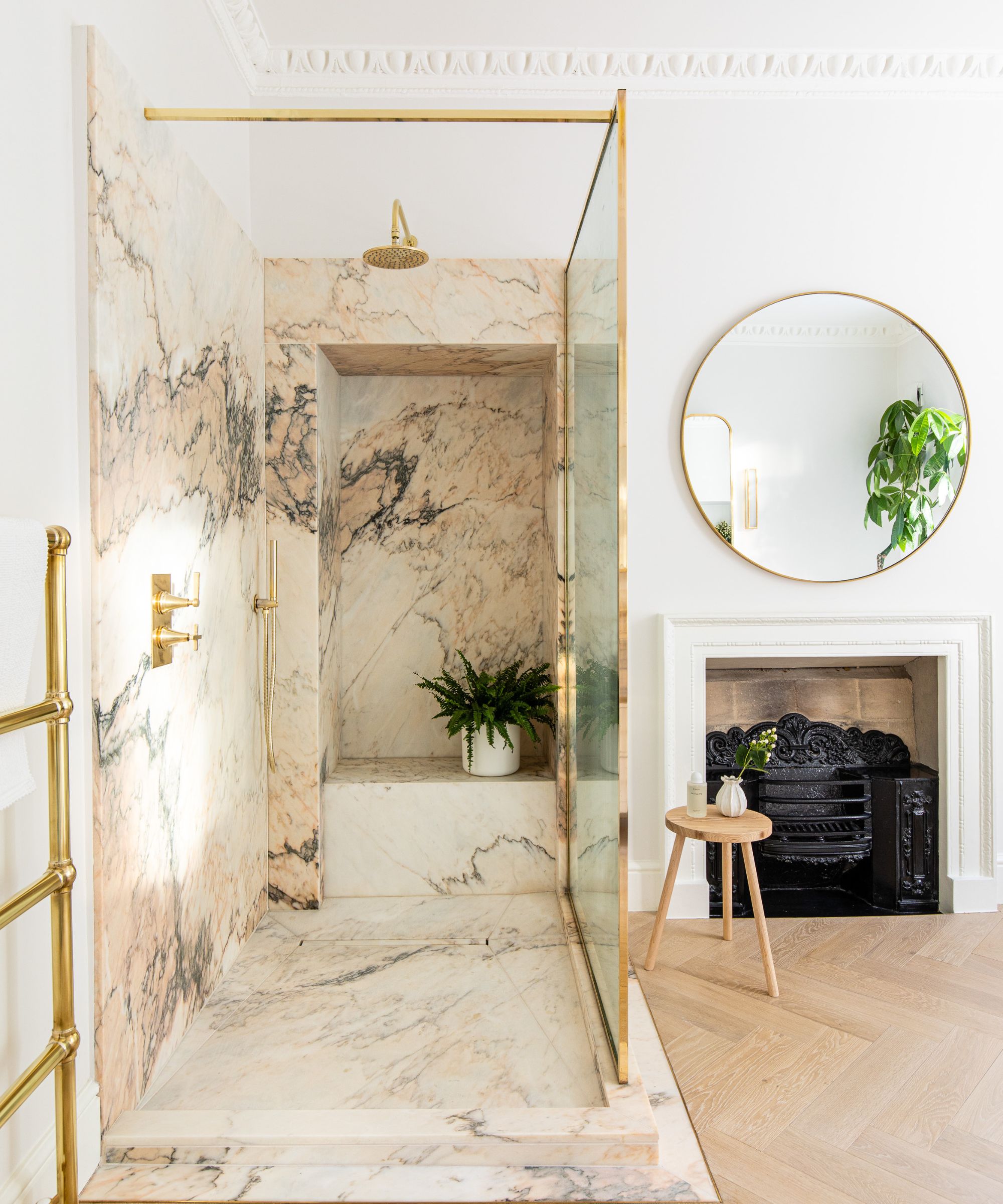
If you're lucky enough to have them, acknowledging and celebrating any existing architectural features in your space will provide you with a storied, authentic, and unique look. This could be as simple as uncovering and restoring your existing wooden floorboards, restoring a traditional fireplace, or keeping traditional crown molding.
'The key factors in a successful transitional bathroom are to honor the materials and scale of the existing architecture, all the while updating them,' says designer Bethany Adams. View these quirks not as challenges but as advantages, creating a narrative that helps you to blend the old and the new.
Victoria Plum's interior designer, Ruth Foster, agrees. 'To achieve the transitional look, I suggest combining a color palette of warm, layered neutrals, a selection of natural materials, a minimalist bath or showering space, and nods to traditional design elements such as a roll-top, freestanding bath,' she suggests. 'It’s also a benefit to make the most of existing design elements in your bathroom, like high ceilings and windows.'
3. Add softness and pattern with wallpaper or fabrics
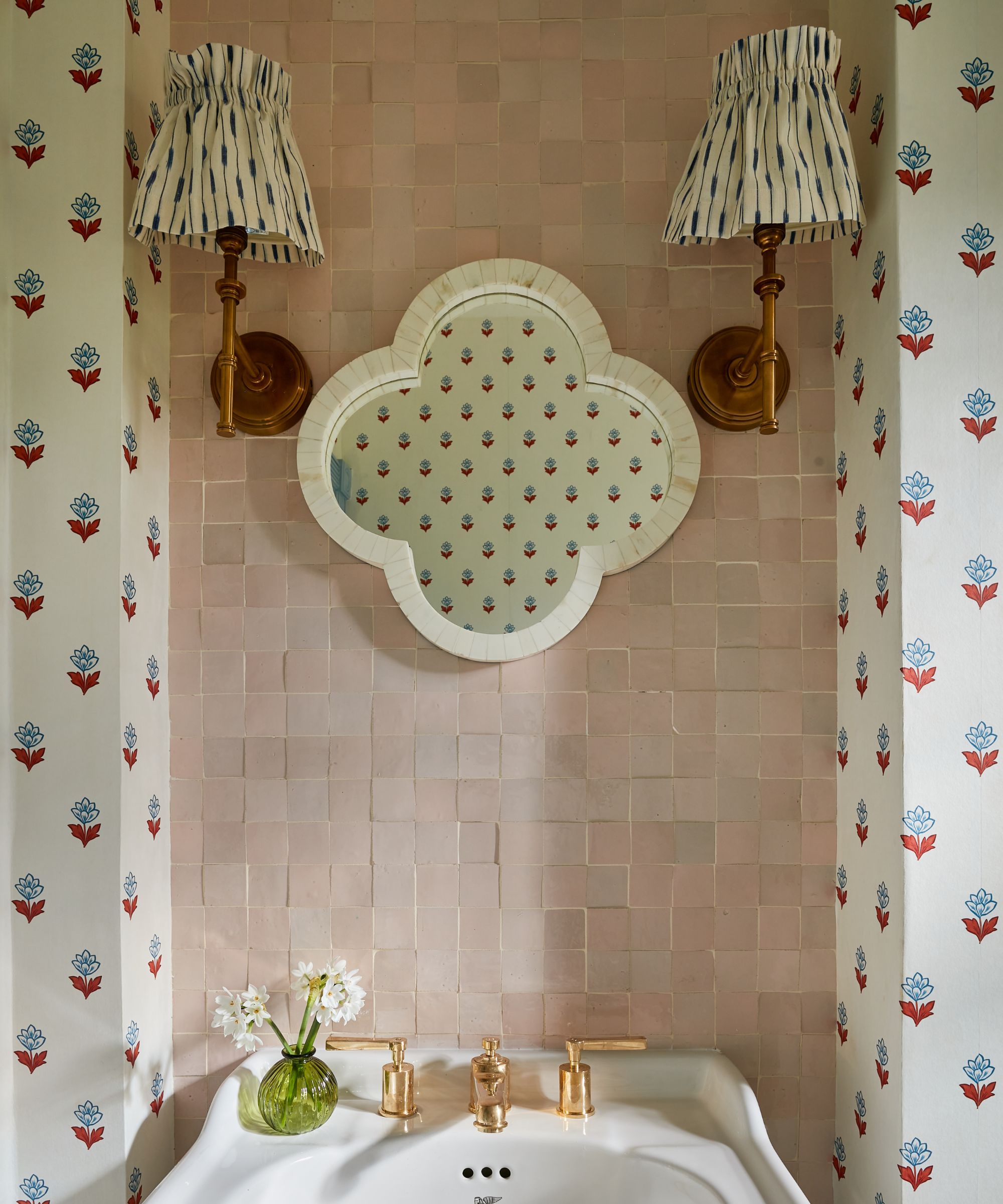
The strategic use of bathroom wallpaper and fabrics can elevate the entire ambiance of the space, infusing it with a sense of warmth and personality.
'I like bathrooms to feel like living spaces – I’m really not a fan of cold, clinical bathrooms fully tiled with porcelain and gleaming chrome fittings,' says Tiffany Duggan, founder of Studio Duggan. 'We tend to start with the aesthetics and then consider how to incorporate the all-important practical requirements,' she explains.
Traditionally fabrics tend to be kept well away from the bathroom, but thanks to clever advancements in textile design and better bathroom ventilation, there's no reason not to decorate with patterns and prints in your powder room. Try upgrading a slatted blind with a soft patterned blind, adding a sink skirt around a pedestal sink (great for concealed storage), or patterned lampshades sat either side of a contemporary mirror like seen above in this space by Mosaic Factory and designer Vaughan Design & Development.
5. Choose tiles that traverse traditional and contemporary
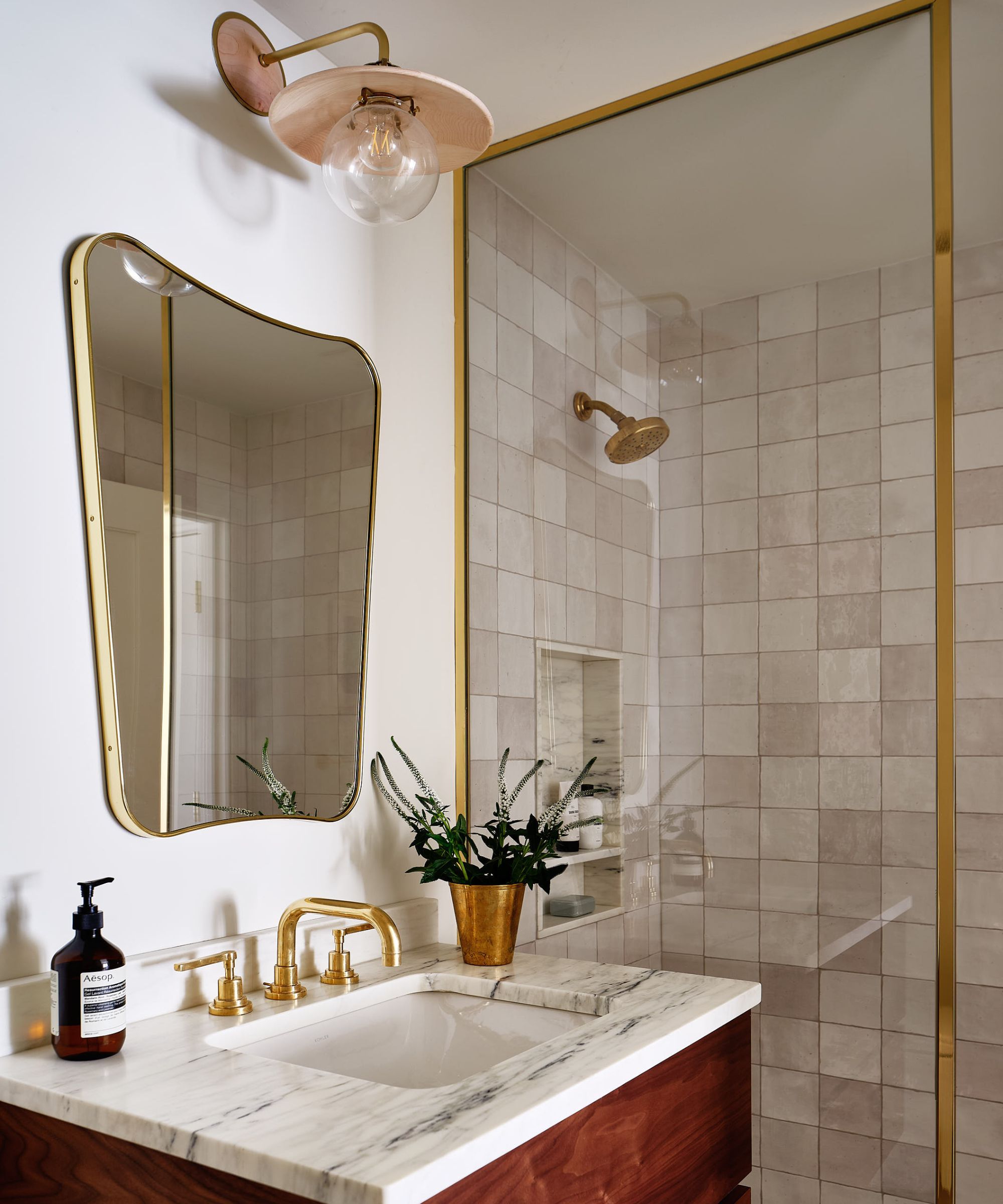
Your choice of bathroom tiles will serve as a pivotal design element, whether you opt for statement contemporary designs or something more subtle and handmade. Modern tiles, characterized by sleek lines and minimalistic aesthetics, ensure the bathroom has a clean canvas for a myriad of decor options.
On the other hand, traditional tiles carry a rich legacy, featuring intricate patterns, textured surfaces, and a sense of craftsmanship. These tiles exude a charm that resonates with the past. Tile experts, it seems, advocate for a mix of both styles, strategically placing modern tiles while incorporating more classic style tiles as accents or focal points.
Grazzie Wilson, head of creative at Ca’ Pietra, says: 'Tiles can be a great way of adding either a traditional or a contemporary spin to your bathroom, working as a backdrop to layering unique pieces to create the overall transitional bathroom space.'
'Even traditional inspired tiles, such as marble, can bring a modern twist when handled and designed in certain ways, or paired with other tiles such as Zellige,' advises Grazzie. 'What you need to decide is whether your tiles will take a starring role – we vote for this one – or whether they serve as more of a backdrop. It might be that your brassware is all important, and so you wish to have a classic tile that shows it off. Or that your tile choice is modern and bold, and that you pair it with traditional brassware that doesn’t over-compete and steal all the attention.'
5. Or, try traditional paneling for a classic feel
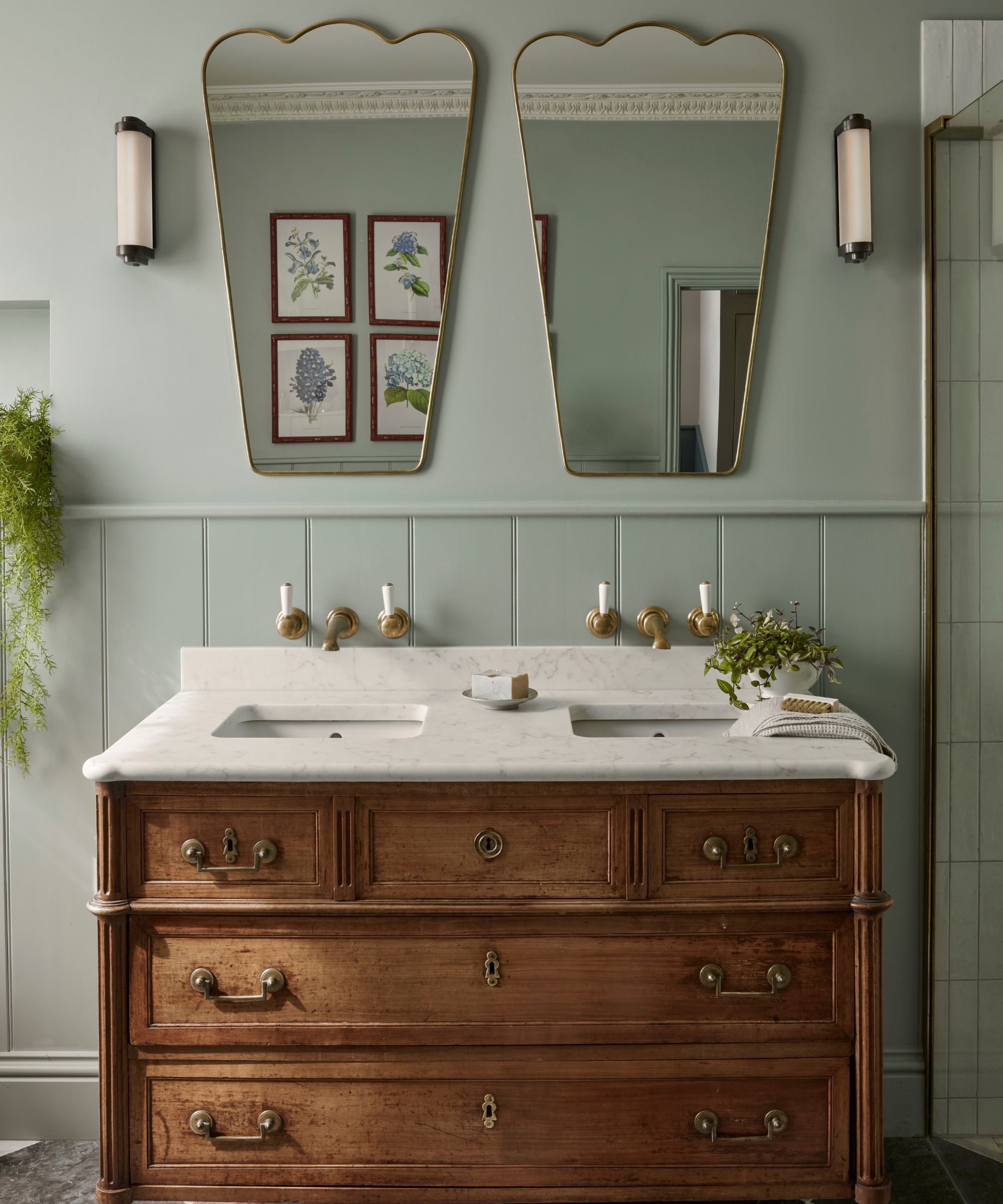
Alternatively, lean further into a softer feel and look to traditional paneling or wainscoting around the lower half of your walls or as a backsplash. When incorporated into a modern bathroom paneling and molding help to achieve that coveted old-new look in a rather simple and affordable manner.
The balance of sleek, modern fixtures against paneled walls adds depth to a small bathroom or helps to create defined zones in a larger space and can be decorated with a vast array of bathroom colors.
Louisa Alice, creative director at Mosaic Factory says: 'Transitional bathrooms combine the timeless chicness of traditional design with modern elements for a fresh, contemporary feel. For an easy approach, narrow down the mix to two different styles.'
If you're wondering how to make a bathroom more relaxing, a combination of tiles and paneling is not only sensible (you wouldn't use paneling in the shower, for instance) but will also steer your bathroom away from a typical cookie-cutter, functional bathroom. 'Choosing an accent tile as one of the main features is a great option. The rustic texture of handmade zellige tiles or classic cement tiles framed with border tiles look incredible in a modern setting, striking the perfect balance of old and new,' adds Louisa.
6. Source antique freestanding furniture or vanity units
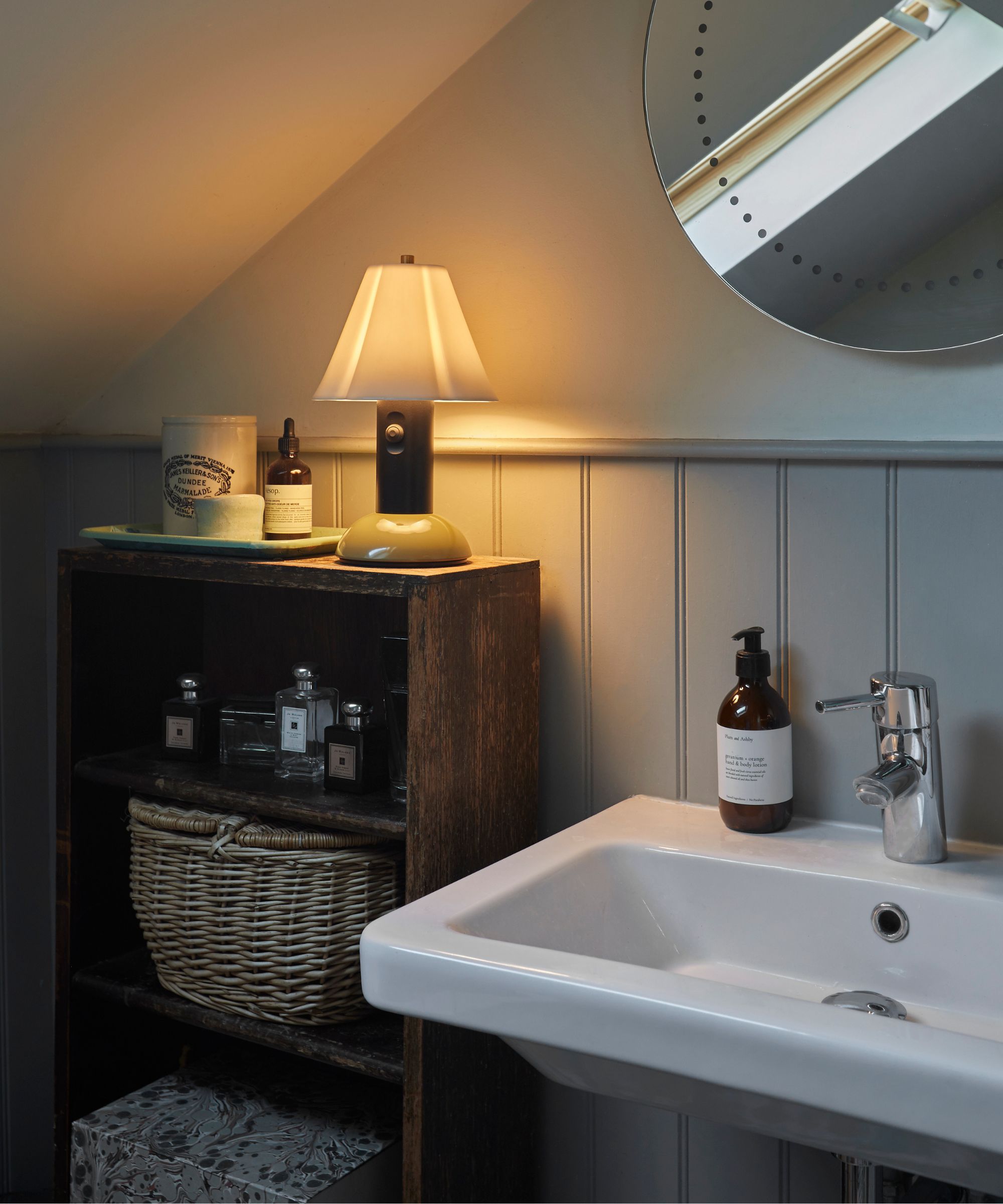
Introducing carefully souced antique and vintage pieces into the bathroom is a surefire way to infuse the space with history and individuality. The magic lies in the details when decorating with antiques. Choosing materials that harmonize, like combining the warmth of wood with the coolness of chrome, for instance, allows for a harmonious coexistence of past and present in the bathroom space.
Barrie Cutchie of BC Designs, advises thinking opposites attract when trying to make this trend a success in your bathroom. 'Traditional boat bath with modern brassware. Contemporary countertop sink on an upcycled vintage piece of furniture. Following this rule will deliver a transitional bathroom with a personality that works!'
Antique freestanding furniture, such as a beautifully restored vanity or a weathered cabinet, not only serves as extra storage but also brings a sense of character and old-world charm with it. More than a piece of storage, these pieces will become decor in the space, too.
Interior designer, Artem Kropovinsky, agrees. 'Including elements made of natural material like marble or wood will make things softer and introduce texture,' he suggests. 'Mixing an opulent marble vanity top with wooden cabinetry can beautifully juxtapose the time-tested charm of marble with antique charm.'
7. Finish the look with vintage decor like rugs, art and lighting
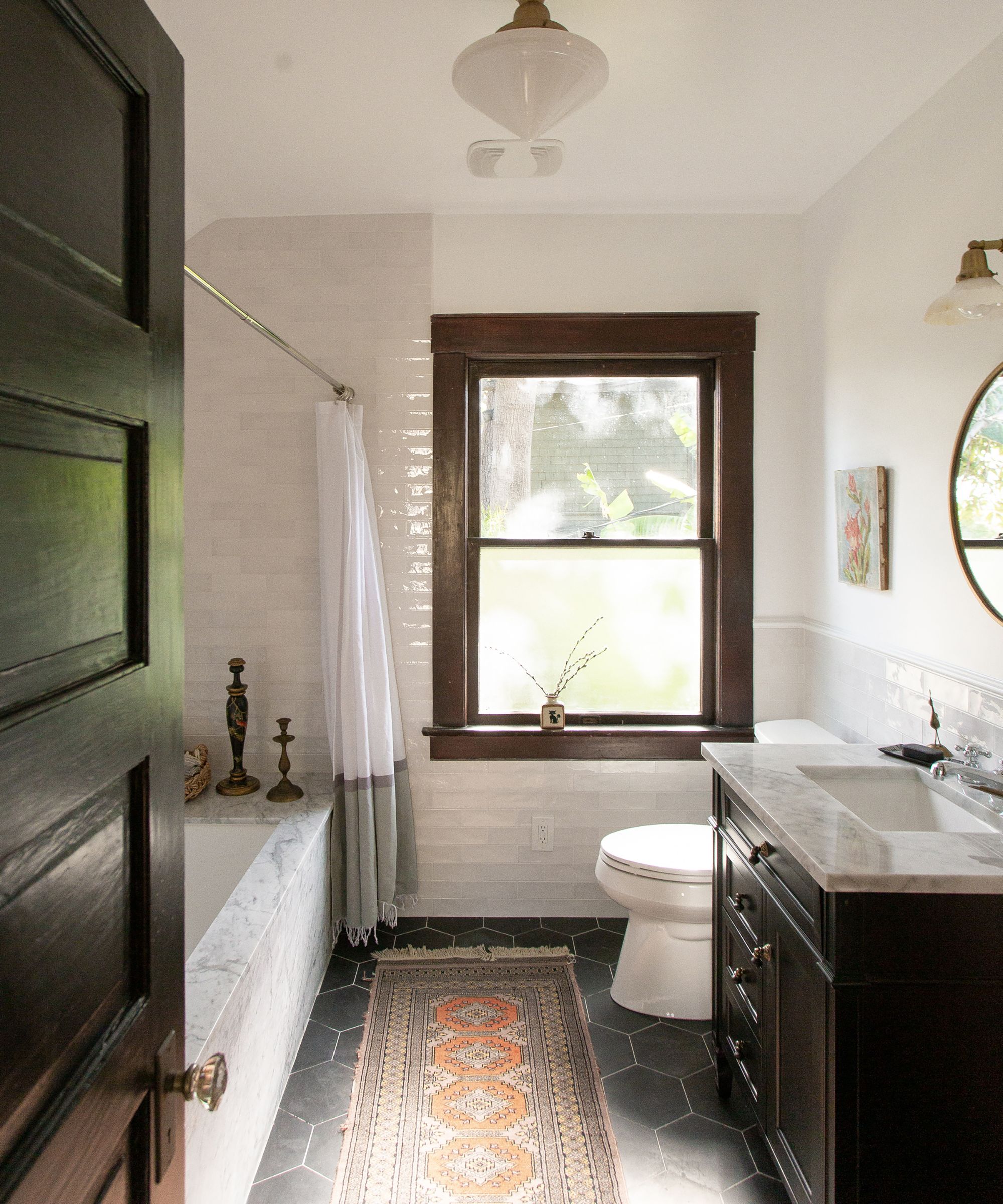
The cherry on top of any transitional style bathroom is, of course, the curation of vintage decor and accessories. Incorporating rugs, art, accessories, and lighting with an antique allure adds layers of nostalgia and achieves a curated and cohesive design.
Whether you choose antique prints or classic paintings, art will always elevate any space. Just be sure to keep it water and steam-proof with a glass frame. Vintage bathroom rugs, with their aged texture, will add warmth underfoot, serving as a visual anchor that ties together the scheme – particularly if you have a more modern bathroom floor.
Good bathroom lighting is crucial. Not only do you want to be able to perfectly illuminate your 5-step night-time routine, but it helps to add a softer ambiance to an otherwise perfunctory space. Consider sconces or ceiling lights with patinated finishes or ornate detailing, and add contemporary spotlights for where you really need them, like in the shower.
Docia Boylen, owner of Handyman Connection of Golden, advises you not to forget lighting. 'You can get old-style light bulbs that bring you back in time, just don’t overdo it. Pick what you want to highlight as old and then modern up the rest.'
'A chandelier of minimalist style or sconces with clean lines in brushed nickel or matte black can be used in the space to provide task lighting and still buy into the mix of old and new,' adds Artem.
If you want to design a timeless bathroom, one that transcends trends and can cope with ever-changing tastes then a transitional approach is best. By mixing different styles, old and new you will always have a space that feels both classic and current, plus you do allow for room into certain bathroom trends should you want.







